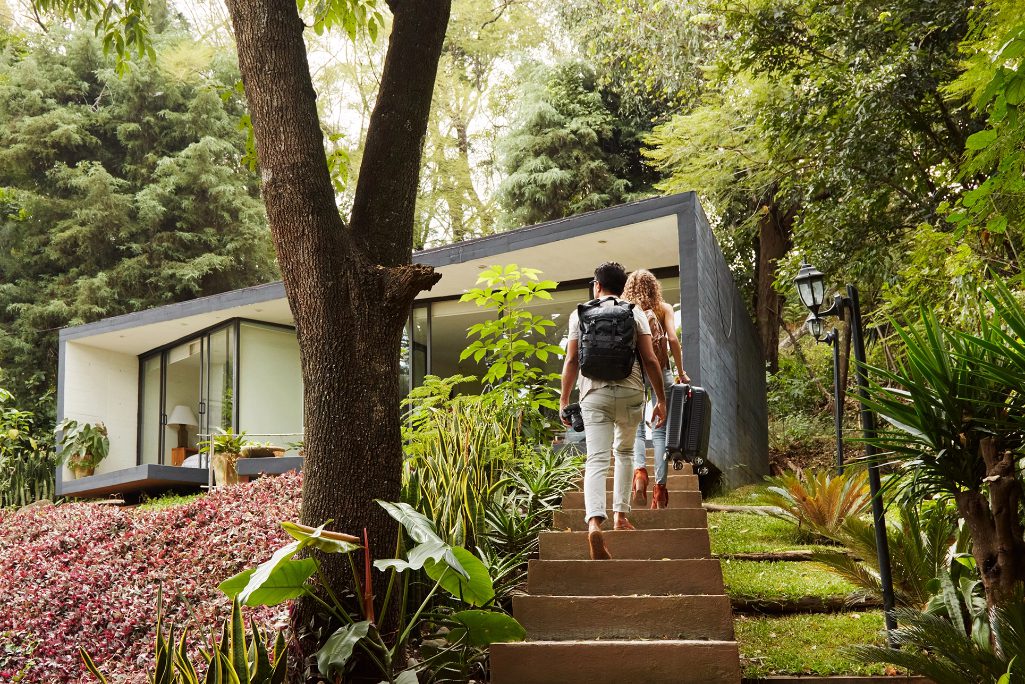Airbnb Claims Leadership of the Travel Recovery But Now Cautions on Variants

Skift Take
As Airbnb narrowed its net loss in the second quarter, and saw most of its key metrics surpass or approach the same period in pre-pandemic 2019, Airbnb co-founder and CEO Brian Chesky boasted to analysts about Airbnb's "leadership" of the travel recovery.
Speaking to financial analysts Thursday from an Airbnb listing in Italy, Chesky said Airbnb hasn't been sitting around idly waiting for travel to return but has been innovating on products for both hosts and travelers. "And as a result, Airbnb has emerged from this crisis faster than others, and we're better positioned for the future of travel," Chesky said.
At various junctures during a question-and-answer session about Airbnb's financial results for the second quarter ending in June, Chesky said about the travel rebound, "Airbnb is leading the way," adding at another point, "Our Q2 results not only demonstrate our leadership in the travel rebound, but also our continued operating discipline."
Despite Airbnb acknowledging in its shareholder letter that the delta variant will render projections about gross bookings, and nights and experiences bookings "volatile and non-linear," chief financial officer Dave Stephenson told the financial analysts that the current July-August-September quarter will see Airbnb's "highest-ever" revenue, "while the profits are going to be the highest ever. And so the business remains very strong."
Airbnb has indeed been well-positioned to flourish during the travel rebound, and Chesky argued that changing travel patterns, such as greater flexibility when and where people travel, in part due to the remote working trend, serve as tailwinds for the company.
Dan Wasiolek, senior equity analyst at Morningstar, said in reaction to Airbnb's financial results that the company has indeed seen the strongest bounce back among its peers.
"The recovery continues to be led by domestic road travel, which has benefitted whole homes, alternative accommodations, and non-urban traditional hotels," Wasiolek told Skift. "Airbnb has seen the strongest recovery back to and above 2019 levels, which isn’t surprising."
But Wasiolek wondered how sustainable Airbnb's advantages might be if remote working doesn't persist at current levels, "and when travel broadens out ... "
"The rate of improvement is likely to come from traditional hotel operators like Hilton as that happens, in our view," Wasiolek said. "That said, Airbnb is a great company, with great revenue growth and margin expansion opportunity, but the valuation is tough to accommodate."
Airbnb's in the second quarter indeed had the smallest net loss, coming in at $68 million, among its peers. Expedia Group had a net loss of $301 million and Booking Holdings was $167 million in the red.
It is difficult to compare this trio of companies since their businesses are so different. Both Expedia and Booking sell a much broader array of travel products, such as flights, vacation packages, and cruises than does Airbnb. However, it should be pointed out that both Booking (852 percent) and Expedia (667 percent) saw their gross bookings rise faster than Airbnb's (320 percent) year over year in the second quarter.
Chesky pointed to Airbnb's improved EBITDA (earnings before interest, taxes depreciation and amortization) margin in the second quarter as proof that the company has been able to get a handle on sales and marketing expenditures, and get more efficient.
"Our adjusted EBITDA profit was $217 million," he said. "Now this represents a 16 percent EBITDA margin. This was more than $600 million of improvement in EBITDA from a year ago, and it represents 20 percent or 2,000 basis points margin expansion from 2019. And this is on a similar level of revenue."
Airbnb's revenue growth was driven by strength in room night growth, particularly in North America, and higher average daily rates, Stephenson said.
He added that Airbnb has seen some retrenchment in demand in July, and suggested this could be because the summer travel season has crested or because of the delta variant.
Airbnb's share price was down nearly 5 percent in after hours trading Thursday evening.





